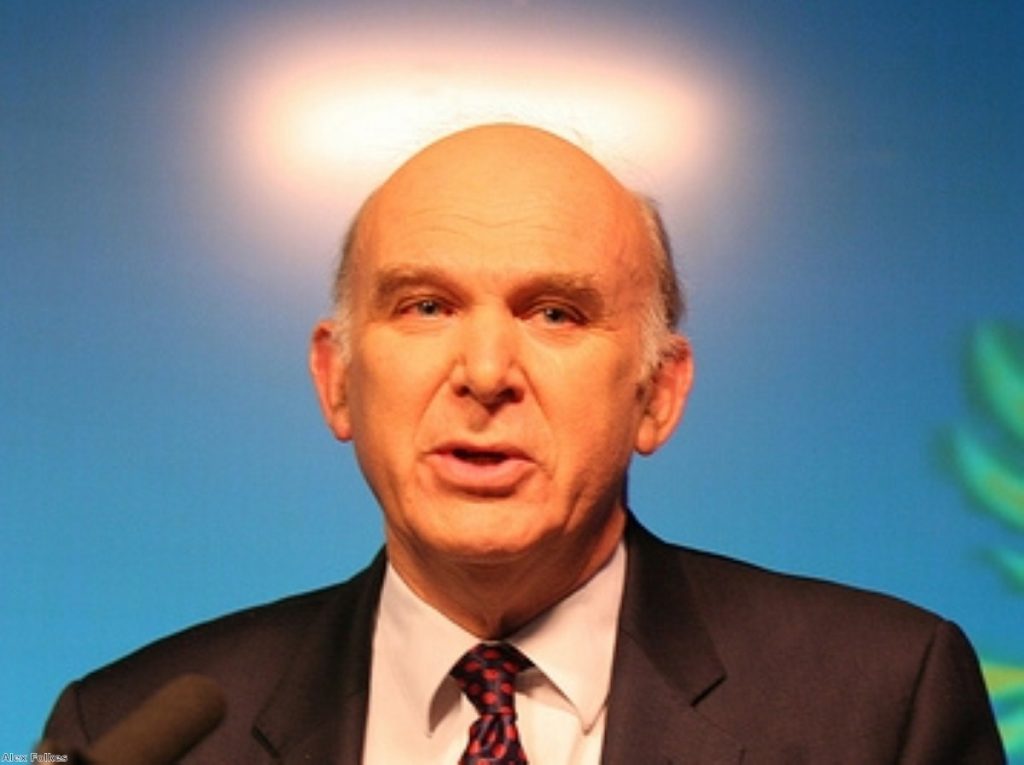Sketch: Subdued Cable’s Commons trudge
Saints are not supposed to have to answer questions, so it’s no surprise the beatific Vince Cable spent his first Commons session looking about as comfortable as a stuffed frog.
Vince Cable has none of the simmering joie de vivre of his predecessor. Had the Lord Mandelson been forced to sit through business questions he would no doubt have gazed imperiously across the benches, letting the little children ask their questions. Cable seemed deeply uncomfortable, like a distracted professor forced to teach instead of read.
Part of the discomfort might have sprung from his alleged reluctance to embrace the coalition’s agenda. Shunted away from the Treasury, he has given the impression his elevation to the government has coincided with the rapid onset of an unfortunately located inflammation.


There was no spark of passion as he defended the government today.
“I don’t pretend the RDAs [Labour’s doomed regional development agencies] will not change,” he said with resignation.
Some or other measure, we were told, “demonstrates our commitment” to this or that principle.
Rather unhappily, Cable explained that the withdrawal of government funding for a company relying on state support had to deal with the “question of affordability”.
“The honourable gentleman’s got to understand we’ve got to do due diligence!” he pleaded. “We already have!” Labour backbenchers replied.
It was not just the substance which provided a cause for unhappiness. There were a few glitches, too. Which was worse: the ebullient John Hayes causing a kerfuffle by forgetting to stand up (“minister… minister?”), or Cable being rebuked “gently” by the Speaker for not addressing the whole House? Even the glitches were mediocre.
Perhaps the worst moment came from business and enterprise minister Mark Prisk, who delivered his answers with all the confident assurance of a magician performing an elaborate trick. He was answering a question about the involvement of women in business by referring to female MPs on the benches behind him. Prisk gestured, without looking, to his left: yet this section of the Commons was occupied only by an elderly Tory – a male, of course. The MP in question didn’t bat an eyelid.
Cable’s malaise repeatedly showed itself with a series of brow-furrowing gestures, as his quaintly keen ministerial team sought to make up for his lack of energy.
David Willetts, who has so much grey matter a growing body of thought holds he is an alien life form, uttered some garble about “fairness for employees”. Ninety-nine per cent of his brain must have been elsewhere.
Hayes, whose intellectual thought must be physically constrained if it is to be harnessed for the good of the country, condemned the “dull utilitarianism” of the Labour government in Churchillian tones.
And who was this individual, who had been completely forgotten about by the Westminster world ever since polling day? Why – it’s Ed Davey, the politician formerly known as a senior Liberal Democrat! He was the frontbencher grasping his bureaucrat’s ringbinder tighter than any of his colleagues.
With Mandelson having stepped aside from his shadow Cabinet role, the supremely sanguine Pat McFadden gave a promising first performance in the role of shadow business secretary. He complimented Cable by remembering their time together for the red cause under the late John Smith.
“That was before he fell in with the wrong crowd,” McFadden suggested, to laughter. With exquisite timing he followed it up still further: “Now he’s fallen in with an even worse crowd.”
Cable’s witheringly polite reply saw him get the last laugh. He thanked McFadden for the “preparatory work he did for private capital to come into the Royal Mail”. The opposition benches squirmed with displeasure, a sight effective like no other in uniting fed-up Lib Dems with their suspicious Tory allies.

